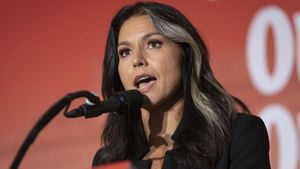Former Arkansas governor Mike Huckabee has been nominated by President-elect Donald Trump to serve as the United States ambassador to Israel, stirring considerable discussion among political and religious circles. Huckabee, who has long championed pro-Israel policies and has been labeled as one of the most ardent supporters of the Israeli settlement movement, brings with him not only years of political experience but also deep evangelical roots.
Celebrated by many in Israeli Prime Minister Benjamin Netanyahu's government, Huckabee's appointment signals intentions to pursue aggressive policies favoring Israeli interests. Huckabee enthusiastically accepts this role; he stated, "I will implement the president’s policy" on matters related to Israel, hinting at potential support for annexation of Palestinian territories, particularly if guided by Trump’s leadership.
For years, Huckabee has actively criticized the notion of Palestinian identity. During his 2008 presidential campaign, he notoriously claimed, "there’s really no such thing as a Palestinian" — asserting it was merely political maneuvering aimed at undermining Israel. Such rhetoric is grounded in his belief system, following old-school Christian Zionism, where Huckabee holds the view of biblical land ownership and sees the return of Jews to Israel as part of divine prophecy.
His theological views are rooted deeply within what is known as dispensational premillennialism, which posits events leading to Armageddon and the second coming of Christ revolve around the state of Israel. Many evangelicals, including Huckabee himself, view their support for Israel as not merely political but as aligning with God’s ordained plan. "This is the land God has promised to the Jews," Huckabee has often said, emphasizing his belief during various speeches and interviews.
Throughout the years, Huckabee has enjoyed the admiration of evangelical communities, often expressing his support for settlements, which he refrains from calling settlements at all; instead, he refers to them as “communities” and steadfastly supports their expansion. He has reinforced this claim by stating, "I never use the term West Bank. It’s Judea and Samaria... We need to use the biblical language," reflecting his approach of restoring the biblical narrative surrounding the land.
His deep-seated support for Israeli official narratives has been echoed frequently, as Huckabee has garnered his fair share of criticism too. Many fear his appointment could derail any existing negotiations for peace between Israelis and Palestinians, transitioning from possible cooperative efforts to unyielding support for Israeli governance across all territories historically considered Palestinian.
Further exacerbation of the situation stems from Huckabee’s biblical justification behind his support for settlements and his outright dismissals of Palestinian nationhood. Critics warn such rhetoric not only undermines peace processes but also inflames regional tensions. Huckabee's views lay dangerously close to fostering violence, especially as tensions have risen post the recent conflict outbreak.His strong influence among Christian Zionists is something many policymakers will have to reckon with during his tenure.
Huckabee has claimed to visit Israel over 100 times over the last five decades, reflecting his deep-seated connection to the land and its people. His advocacy for Israel aligns with movements among American evangelicals to bolster the Jewish state through donations and political capital, often sometimes surpassing contributions made by Jewish Americans.
Trump's previous administration adopted similar policies, leading to landmark decisions such as moving the U.S. embassy from Tel Aviv to Jerusalem and recognizing the Golan Heights as Israeli territory without considering the diplomatic repercussions these actions would create. Huckabee's appointment signals continuity of this approach, as he stated he would follow Trump’s agenda closely.
This nomination raises questions about the future of Israeli-Palestinian relations, intensifying discussions among international observers about the potential outcomes of U.S. foreign policy under Trump’s renewed presidency. While supporters view Huckabee as someone who embodies strong U.S.-Israeli relations, opponents see his appointment as threatening to already delicate diplomatic ties and detrimental to Palestinian rights.
Huckabee’s fervent views have positioned him as polarizing, with many considering him too extreme for moderates both within the U.S. and internationally. His past comments would suggest he views the struggle of Palestinians only through the lens of Israeli security needs. Huckabee insists, "They’re [Israelis] fighting for their very existence — not for taxes or vacations but for survival against forces aimed at destroying them."
Interest groups across demographics are eagerly awaiting Huckabee's confirmation hearing as discussions on his actions and words echo through the halls of Congress and global forums.



